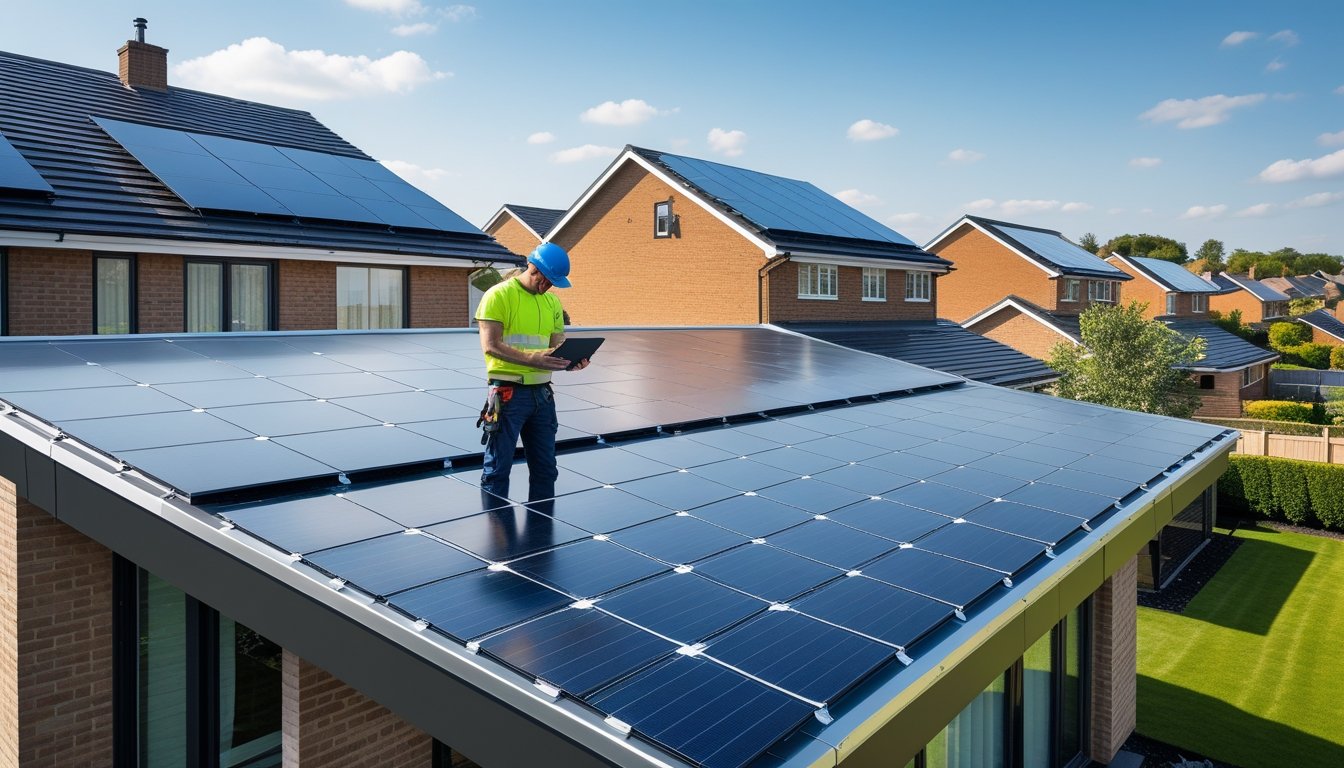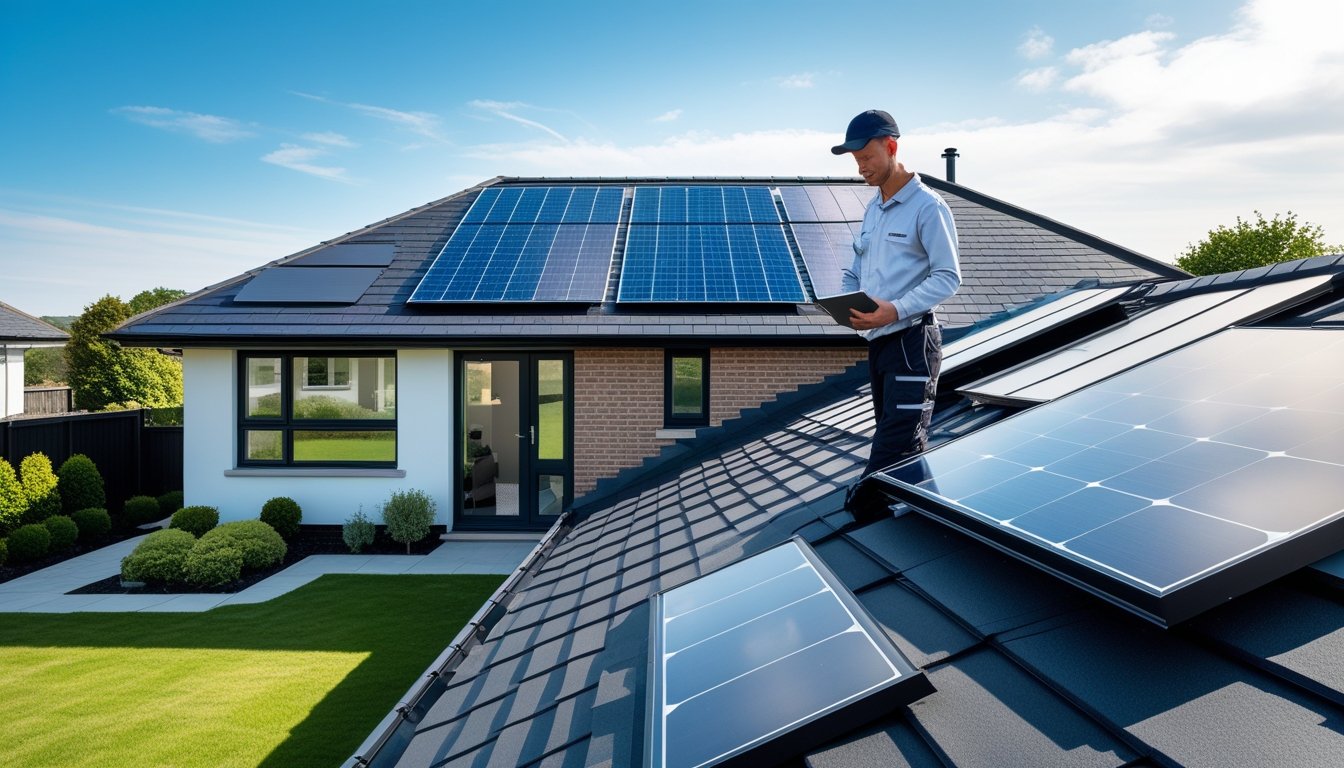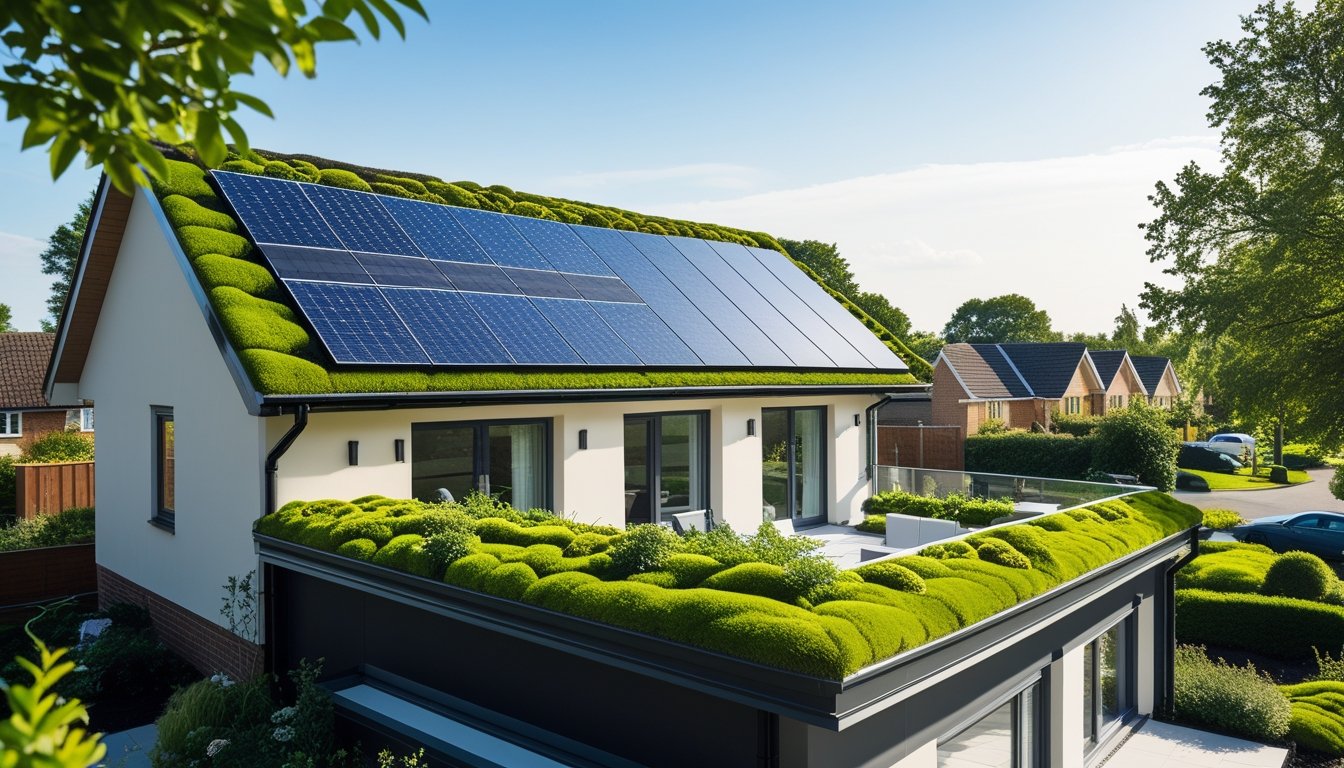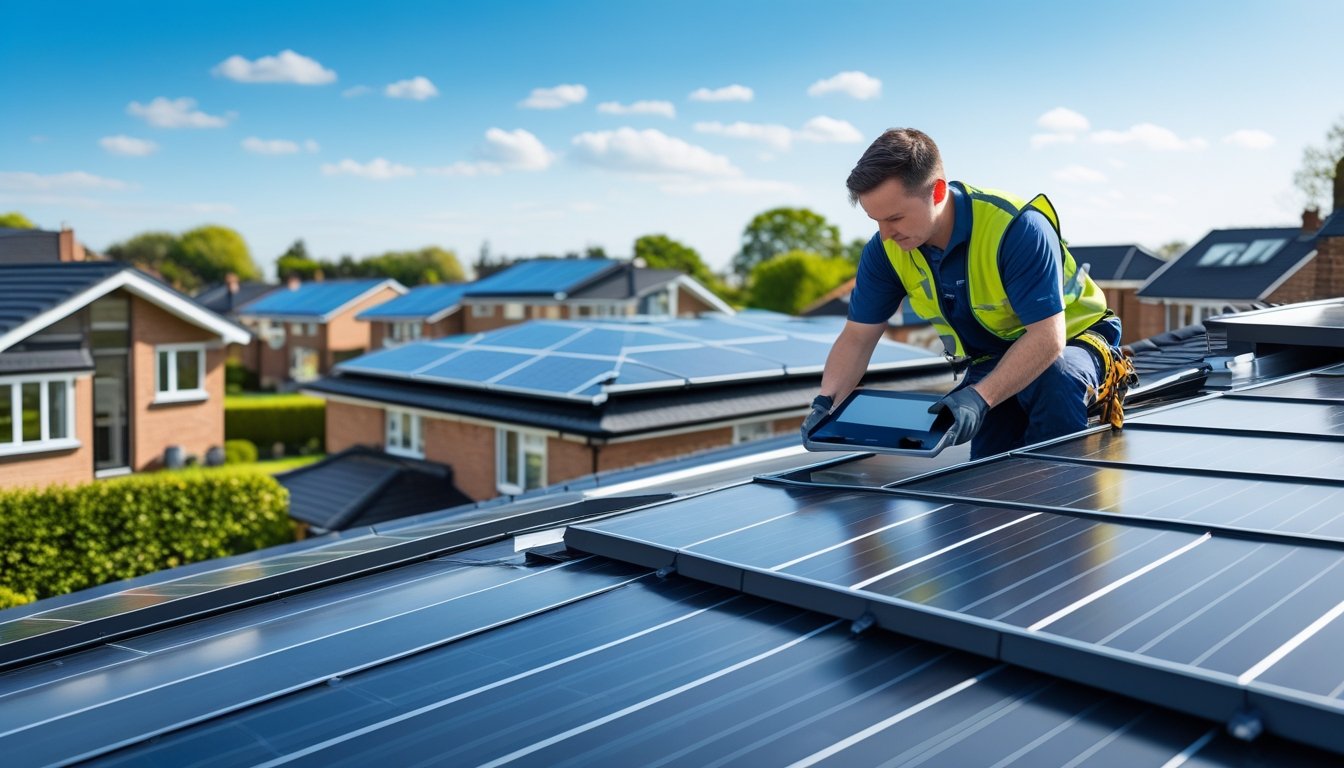Late updated: 30 Jun 2025 13:06
Written by: Oliver Bennett
Future-Proofing UK Homes With Cutting-Edge Roofing Tech: A Guide for Homeowners
The landscape of roofing in the UK is undergoing a substantial transformation, driven by advanced technologies and sustainability needs. With climate change impacting weather patterns and increasing energy demands, our roofs must not only protect us from the elements but also contribute to energy efficiency and environmental conservation. Cutting-edge roofing technologies offer the potential to future-proof UK homes by enhancing durability and incorporating energy-saving features.

From smart systems to sustainable materials, the evolution of roofing technology addresses both functional and ecological concerns. We are witnessing the integration of features like solar panels and intelligent climate management systems that promise to make our homes not only more resilient but also eco-friendly. This represents a significant shift, ensuring that our living spaces adapt to a changing world while maintaining comfort and efficiency.
As we explore the frontier of roofing innovations, our focus remains on providing solutions that meet the demands of modern living while preparing for future challenges. By embracing these advancements, homeowners can achieve long-term value through increased energy efficiency and reduced environmental impact.
Key Takeaways
- Innovative roofing integrates sustainability with resilience.
- Future-proofing involves smart tech and eco-friendly materials.
- Cutting-edge solutions address both function and future challenges.
Innovative Roofing Technologies for Future-Proofing UK Homes

Staying ahead in the evolving landscape of roofing technology is vital for UK homeowners looking to enhance energy efficiency and integrate sustainable solutions. In the following sections, we'll explore three pivotal innovations: smart roofing systems, advanced insulation, and solar panel integration.
Smart Roofing Systems for Home Automation
Smart roofing systems are revolutionising home automation by merging cutting-edge technologies with traditional roofing elements. These systems often incorporate sensors that can monitor and manage variables such as weather impact, moisture levels, and energy use.
Smart thermostats and other integrated devices provide homeowners with real-time data, enabling efficient control over heating and cooling. The combination of home automation with roofing technology not only promotes enhanced energy efficiency but also contributes significantly to reducing overall energy consumption.
These advanced systems enable seamless integration with other smart home devices, offering enhanced convenience and control. As technological advancements continue to shape construction and home renovation trends, smart roofing stands out as a critical component in future-proofing our living spaces.
Advanced Insulation and Thermal Performance
Effective insulation is crucial for optimising thermal performance and energy efficiency. The latest materials provide superior thermal regulation, vastly improving upon traditional methods.
Eco-friendly and bio-based materials are gaining traction, offering enhanced energy performance along with a reduced environmental footprint. Such materials contribute to better heat retention in winter and effective cooling in summer, supporting year-round comfort.
By investing in advanced insulation, we improve our homes' energy efficiency, reduce utility costs, and bolster the sustainability credentials of our properties. This approach is essential for those aiming to align with modern construction practices and sustainable living standards.
Solar Panel Integration and Renewable Solutions
Solar panel integration offers a sustainable way to meet energy needs. Advances in solar technology have led to more efficient, aesthetically pleasing installations that can be seamlessly incorporated into existing roofing structures.
The use of photovoltaics not only cuts energy bills but also supports the shift towards renewable energy sources and reduces reliance on fossil fuels. For UK homeowners, integrating solar panels is a significant step towards achieving a more sustainable and future-proof home.
Renewable solutions, including solar energy, are central to current and future home renovation projects. Embracing these technologies positions us to lead in energy innovation while fulfilling both environmental and economic objectives.
Sustainable and Eco-Friendly Roofing for Long-Term Value

As we focus on future-proofing homes, sustainable roofing emerges as a key component. By incorporating eco-friendly materials and innovative designs, we can significantly lower carbon emissions, counteract the impacts of climate change, and enhance the overall comfort and security of our living spaces.
Eco-Friendly Materials and Carbon Emissions Reduction
The choice of roofing materials plays a pivotal role in reducing our environmental footprint. Eco-friendly materials such as recycled metals, green roofing, and solar tiles can substantially decrease carbon emissions associated with traditional roofing options. These materials not only contribute to energy efficiency but also lower waste due to their longevity and recyclability.
In selecting materials, we look for those that reflect more sunlight, thus reducing the amount of heat absorbed by the building. This helps in maintaining indoor temperatures, leading to reduced energy consumption for cooling. With these benefits, eco-friendly roofs support a sustainable future while enhancing property value.
Climate Change and Environmental Impact on Roof Design
Roof design must adapt to the changing climate and its ensuing environmental challenges. As climate change impacts weather patterns, we must consider materials and designs that withstand extreme conditions like heavy rainfall and strong winds.
Incorporating biodiversity through living roofs, which support vegetation, enhances resilience against temperature fluctuations. These designs also contribute to urban biodiversity, offering habitats for various species. By acknowledging environmental impacts, our roof designs stay robust and ensure long-term durability. Sustainability thereby becomes an intrinsic aspect of future-proofing homes.
Enhancing Comfort, Indoor Air Quality, and Security
Sustainable roofing boosts comfort and security within homes. By enhancing thermal comfort, such roofing mitigates extremes in indoor temperatures. Features like natural ventilation systems tied to roof design improve indoor air quality, essential for a healthy living environment.
Security solutions integrated into modern roofs, like reinforced materials and advanced insulation, provide additional protection from potential intrusions and environmental hazards. Our emphasis on eco-friendly roofs means ensuring a safe, healthy, and comfortable home environment while elevating the long-term value of properties.
Frequently Asked Questions

Let's address some common questions about how advanced roofing technologies can transform UK homes. From boosting energy efficiency to preparing for severe weather, these innovations offer multiple benefits.
What are the latest advancements in roofing technology for energy efficiency?
Modern roofing technologies now incorporate smart systems and energy-efficient materials. These include solar-integrated roofing and highly reflective surfaces that reduce heat absorption. By employing these technologies, we can achieve significant energy savings and contribute to a more sustainable future.
How can homeowners ensure their roofs are prepared for extreme weather conditions?
To withstand extreme weather, it's crucial to use durable materials resistant to wind and water. Installation of weatherproof membranes and securing loose fittings can also make a significant difference. Regular maintenance and professional assessments ensure that our roofs remain fortified against harsh conditions.
What materials are leading the way in sustainable roofing solutions?
Sustainable roofing focuses on materials that are eco-friendly and boast longevity. Options like recycled shingles and green roofs are popular nowadays. These materials not only reduce waste but also improve insulation, providing a cost-effective solution in the long run.
How often should roofs be inspected to maintain their integrity over time?
Regular inspections are vital for maintaining roof integrity. We recommend professional assessments annually or after major storm events. These checks can identify potential issues early, preventing costly repairs and ensuring that our roofs last longer.
What are the financial benefits of investing in advanced roofing systems?
Investing in advanced roofing systems can lead to long-term financial benefits. These installations often come with government incentives and lower energy bills. Moreover, cutting-edge roofs can enhance property value, offering a good return on investment over time.
What role do green roofs play in urban sustainability and how are they implemented?
Green roofs contribute significantly to urban sustainability by improving air quality and reducing heat islands. They involve layering vegetation over waterproof membranes. Such rooftops not only provide environmental benefits but also present a unique aesthetic appeal, transforming urban landscapes.
